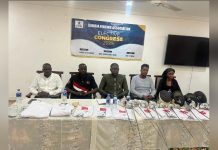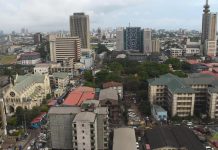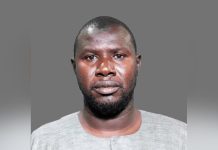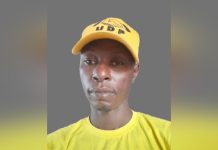Africa-Press – Gambia. This is UP FIRST Sunday. I’m Rachel Martin. The poet Tracy K. Smith has never been afraid to write about difficult things. In fact, she uses her poetry to ask questions about inequality and political unrest.
TRACY K SMITH: But I’ll be honest and say that for most of my career, there has been an intellectual distance between myself and these questions.
MARTIN: That distance began to close in the summer of 2020 as high-profile murders of Black Americans led to protests all over the country.
(SOUNDBITE OF PROTEST)
UNIDENTIFIED CROWD: (Chanting) For justice, for peace.
SMITH: I think that being held in place in the uncertainty of a pandemic meant that we were all watching in the same direction at once, and many of us felt convicted by what we witnessed.
MARTIN: Tracy Smith, we should say, is a Black woman. This pain cuts deep into her psyche.
SMITH: I think we were all grieving many things. But for me, I was grieving the misconception that I had been free in this country in the ways that I thought I was, misconception that the work of racial justice was something that had been settled to a large extent by the generations that preceded me.
MARTIN: Smith teaches poetry at Harvard and served as the U.S. Poet Laureate from 2017 to 2019. So she could have easily felt like she had arrived – right? – That she had found her voice. But she says the summer of 2020 changed the way she writes.
SMITH: It emboldened me even further to say and do what I can say and do to the fullest of my ability and to not second guess that I am not doing things and saying things in the way that somebody else must.
MARTIN: Here’s one poem that came from that period of introspection.
SMITH: (Reading) Light atop the water. The form in the water. The after image of water. Standing, falling, risen over and again. Freedom is labor. To labor at oneself. To keep what is earned. To disappear, reemerge, plunging and carried. Lightness and burden. The smallest waves shingle in. Are tugged back to surge, to rise, to be swallowed and remain. They are the wet in the sand, spreading in and down, dark center of the old stain. The wave after wave is one wave never tiring. Freedom is fearsome. A nut drops onto fallen leaves, and my heart leaps. What approaches through this ringing in the trees? And what warning does it carry from the sea?
(SOUNDBITE OF MUSIC)
SMITH: Poetry brings us away from the veneer or the surface of things, which is where we often live. And it allows us or emboldens us to plunge into a kind of depth.
(SOUNDBITE OF MUSIC)
MARTIN: Today is Juneteenth – the holiday commemorating the emancipation of African American slaves in this country. And to honor that, we’re thinking about how Black poets like my guest, Tracy K. Smith, have used their words not just to push for change to fight against racism but as proof of their own humanity. And they have done this for centuries. Coming up, we’ll take a journey through time as we hear the words of Black poets.
Welcome back to UP FIRST Sunday. One of the ways Tracy K. Smith changed her poetry practice after the summer of 2020 was by adding a mindfulness exercise that she admits might sound a little bit weird.
SMITH: You know, going into this sort of weird zone of saying, I’m meditating. I’m talking to ancestors – that’s not an everyday thing that people admit to.
MARTIN: She developed this kind of meditative dialogue with her ancestors.
SMITH: It consoled me. I understood I was not alone, that what was happening to me had happened to people I love and people I don’t know but whom I descend from.
MARTIN: And Smith says it helped her see her writing as part of something bigger.
SMITH: That it’s the continuation of generations and centuries of work toward genuine freedom, liberation for not just Black people but all people.
MARTIN: That’s what Tracy K. Smith is going to help us do today – to connect with this legacy of written work, the truth it lays bare and the call to action meant for all of us to hear. Each of the poems she brought us is written by a Black American who was responding to the culture and the political climate of their time. And we’re going to start with Phillis Wheatley, an enslaved woman who lived in the late 1700s.
First off, for those who don’t know, tell us about this poet.
SMITH: Phillis Wheatley was stolen from Senegal or Gambia in West Africa when she was just a little girl. She was about 7 years old. And they gathered that she was about 7 after surviving the middle passage because when she arrived on these shores and was, you know, put up for auction, she was missing her front teeth. And she was sold to a family called the Wheatleys. And the family recognized that she was really smart, precocious. They taught her to read and write. And they allowed her to, you know, study, which was, you know, quite rare in that time period. And she began to write poems from a really young age. I think her first poem was published when she was a teenager.
And what her work did, which is what all poems do – but for a Black person, this was huge in the white imagination. Her poems attested to the presence of a living mind and spirit, an interior life when these are things that, to justify slavery, people said Black people did not possess. So I’ll read this excerpt of one of her famous poems, which is “On Imagination.” And this is just one stanza. But I think it it gives a sense of that inner life that that Wheatley and others, countless others claimed and craved.
(Reading) Imagination. Who can sing thy force? Or who describe the swiftness of their course? Soaring through air to find the bright abode, the Imperial Palace of the thundering God. We on thy pinions can surpass the wind and leave the rolling universe behind. From star to star, the mental optics rove, measure the skies and range the realms above. There, in one view, we grasp the mighty whole. Or with new worlds imagine the unbounded soul.
I mean, it’s poignant to imagine, to recognize that this sense of freedom and fullness and proximity to something like God, something as powerful and universal as creation, is something that someone who’s enslaved can only access by means of the imagination. And so to bear witness to that and celebrate that is an act of beautiful expression and affirmation. But it’s also a hugely political act.
MARTIN: Right. Just the laiming of it. Let’s go to George Moses Horton. He was a poet who was enslaved in North Carolina and lived to see emancipation, right?
SMITH: Right. For many years, he composed his poems orally and would recite them for people, oftentimes students in Chapel Hill for money. And so he earned some money by doing this. And he learned to write in 1832 and began to compose his poems in that form. This is another excerpt of a poem called “On Liberty And Slavery,” which appeared in his first book, which was published in 1837. And I’m going to share it because you can hear it reference Phillis Wheatley’s work, you know? Not only the term pinions as a way of thinking about the soaring of the imagination, but there’s also a moment where he mentions Afric’s Grove, you know, a little abbreviation of Africa, which is a line also from one of Wheatley’s poems in which she’s imagining the Roman poet Terena who she describes as of Afric’s sable race. So this is a way that, you know, again, lineages is invoked, community is built by calling out to others who share your sense of urgency and your plight in many ways.
(Reading) Soar on the pinions of that dove, which long has cooed for thee, and breathed her notes from Afric’s Grove, the sound of liberty. Oh, liberty. Thou golden prize, so often sought by blood. We crave thy sacred sun to rise, the gift of nature’s God. Bid slavery hide her haggard face and barbarism fly. I scorn to see the sad disgrace in which enslaved I lie.
MARTIN: Do we know the breadth of the audience for that work? I mean, who absorbed these poems, Horton’s in particular, at that time?
SMITH: Well, I think that in some ways, you know, there’s a university community there that was probably intrigued. I want to believe that there were many people who felt compelled or convicted by the power of an enslaved person’s voice, the courage, as well. But poetry is interesting. Because even if you are not seeking out meaning, the sounds and the rhythms and the images and the momentum of poems, especially poems that are as rhythmic, you know, these are rhymed and metrical poems. They kind of catch you up in a way. And so I can also imagine that in addition to students or faculty members who might have been standing or passing by the university gates, there were other people who said, what is this voice saying? And for whom these words itched something, you know, activated a question or a realization.
MARTIN: Langston Hughes, born right at the beginning of the 20th century. He died during the civil rights movement. You have brought a poem called “Dream Variations.” Tell me about it.
SMITH: Yeah, well, you know, Langston Hughes is kind of like the headliner of the Harlem Renaissance and a wonderful jazz poet. Someone whose work celebrates Black voices, Black life, and, you know, dreams run through his work. The dream of freedom, the dream of America as a space where all can be free and valued. This is a poem in which he brings images to bear upon what freedom – the dream of freedom might feel like for someone like him.
“Dream Variations.” (Reading) To fling my arms wide in some place of the sun. To whirl and to dance till the white day is done. Then rest at cool evening beneath a tall tree while night comes on gently, dark like me. That is my dream. To fling my arms wide in the face of the sun. Dance, whirl, whirl till the quick day is done. Rest at pale evening. A tall, slim tree. Night coming tenderly, black like me.
I love the fact that these two stanzas, which are quite similar to one another, have minor variations that give us a sense of – I don’t know – something deepening. So in the opening, he says, you know, to fling my arms wide in some place of the sun. And some place – it’s two words so it almost feels, like, even farther away than if it were conjoined, you know, as though this is just a fantasy. And, you know, the speaker imagines whirling and dancing, which is joyful till the white day is done. And so suddenly, I begin to think of social conditions, you know.
And dark like me. Night coming on gently, dark like me – toward the end of that stanza also makes me feel like, you know, the distance and perhaps isolation that a Black person in America is made to feel on a daily basis. This is a wish that’s dispelling that. And night is embracing him as of itself, you know, as at home in that space. So, you know, the quick day is done and then rest at pale evening. It’s no longer like beneath a tall tree. It’s the speaker becomes a tree – a tall, slim tree. So that the sense of becoming at home and one with the world becomes literal in that image. And I think it’s a poem that is gentle, but it invokes this growing sense of desire to belong and be at home in this world that we know, this world that we make together.
MARTIN: We’re going to take a short break. And when we come back, Tracy K. Smith will take us to the present.
This is UP FIRST Sunday. We are back with poet Tracy K. Smith. She’s been sharing poetry from Black writers from the 1700s to the present in honor of Juneteenth, poems that share this common idea of freedom and a desire to prove one’s humanity to people who don’t see it. Up next is Lucille Clifton, who started publishing her work in the late 1960s and lived until 2010.
SMITH: Clifton used to describe her goal in writing as comforting the afflicted but also afflicting the comfortable, startling us sort of certainty, complacency or authority that may be dangerous or counterproductive to the work of real liberation. And that vision extends beyond the world of people where these hierarchies of power and these practices of violence – we know what they do to people. She reminds us that the natural world is also subject to the presence – the violent presence of humans. And we’re not going to make it as a species if we don’t get these things under control, if we don’t push back against these notions that tell us some people are better than other people or that people have more of a right to exist in safety and comfort than the Earth itself.
MARTIN: “Study The Masters” is the poem.
SMITH: “Study The Masters.” (Reading) Like my Aunt Timmie. It was her iron, or one like hers, that smoothed the sheets the master poet slept on. Home or hotel, what matters is he lay himself down on her handiwork and dreamed. She dreamed too, words – some Cherokee, some Masai and some huge and particular as hope. If you had heard her chanting as she ironed, you would understand form and line and discipline and order and America.
I love this poem because it upends our received notions of mastery, authority. So there’s a master poet in the poem, but he’s not the master of the poem’s title. The poem urges us to think that there are masters among us who are unseen and unsung but whose work is incredibly necessary and moreover instructive. They could tell us things about the world that we think we know and the world that we need to know.
MARTIN: And that takes us to now. I mean, we’ve really worked our way through time with all these poems, and now we’re going to end with a contemporary of yours, Ross Gay.
SMITH: Yeah. Ross Gay is such a wonderful poet whose poems, and his essays, as well, celebrate and honor joy, large and small, beauty, natural and the beauty we offer to one another. But like all the other poems we’ve been reading, his work is also rooted in the fact that these realizations, as they align with Black life, are political. They’re choices that we’ve been taught not to make and that we must allow ourselves to learn to make. And so this is a poem that I think honors the life and protests the murder of Eric Garner, who was killed by an illegal chokehold.
MARTIN: Right. I just want to remind people. So Eric Garner, yes, killed by police in 2014 while they were trying to arrest him for selling single cigarettes. And his last words were, I can’t breathe. The poem here is called “A Small Needful Fact.”
SMITH: “A Small Needful Fact.” (Reading) Is that Eric Garner worked for some time for the Parks and Rec Horticultural Department, which means, perhaps, that with his very large hands, perhaps, in all likelihood, he put gently into the earth some plants which, most likely, some of them, in all likelihood, continue to grow, continue to do what such plants do, like house and feed small and necessary creatures, like being pleasant to touch and smell, like converting sunlight into food, like making it easier for us to breathe.
MARTIN: Wow.
SMITH: Yeah, this poem does a lot. You know, it aligns, every step of the way, the legacy in the hands and the body and the intention of this Black man. And in America, whether we agree with it or not, there’s so much that informs our view of Black men and tells us they are to be feared. They’re up to no good. They’re violent. They are not occupied productively. And so this poem, you know, reminds us that with his very large hands, he put things gently into the earth which grow and cause all of us in one way to flourish.
(SOUNDBITE OF MUSIC)
MARTIN: Tracy K. Smith. She’s a professor of English and African American studies at Harvard and a former U.S. poet laureate. You can find more of her work at poetryfoundation.org. You can also find more of Ross Gay’s work at splitthisrock.org. Today’s episode was produced by Lee Hale and edited by Jenny Schmidt. Our supervising senior producer is Bruce Auster, and our supervising producer is Liana Simstrom. We’ll be back tomorrow with all the news you need to start your week. Until then, happy Juneteenth.
For More News And Analysis About Gambia Follow Africa-Press






